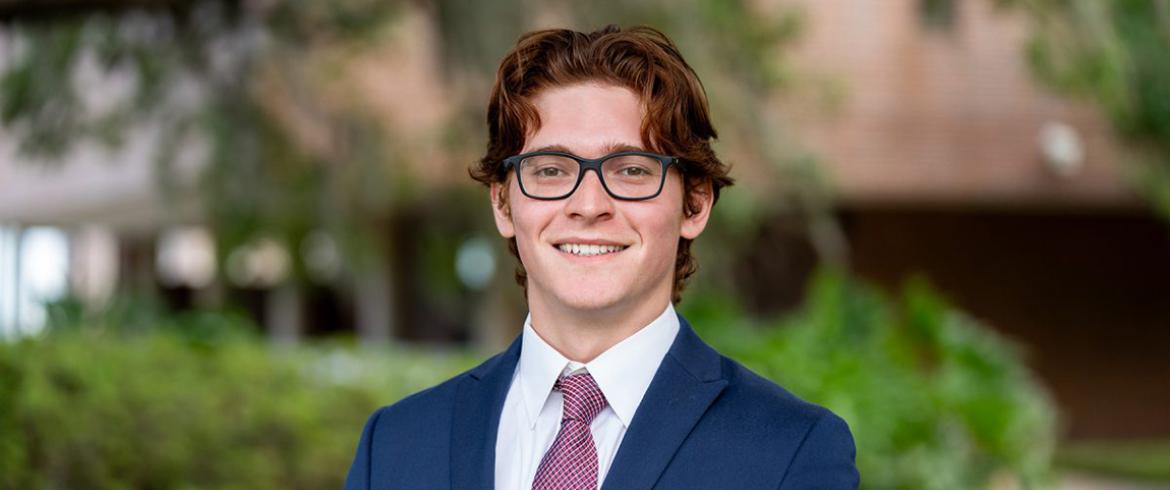
Sebastian Castro is a third-year chemical engineering student at Florida State University and the FAMU-FSU College of Engineering. (FSU Comms)
Sebastian Castro found a welcoming and supportive environment at Florida State University and was drawn to its programs and campus beauty.
As a Presidential Scholar and undergraduate in chemical engineering, he said he received invaluable support and connected with a special community of students.
He conducted research at Caltech’s WAVE Fellows Program and attended the Hispanic Scholarship Fund’s STEM Summit to broaden his knowledge and network. He served as regent of the Theta Tau Professional Engineering Fraternity, where he aimed to enhance brotherhood and professional growth. As a Student Engineering Leadership Board member, Castro enriches student life while promoting mentorship and research opportunities.
“I believe that finding a community and taking advantage of available resources is important for supporting the well-being of my peers.”
Castro won two Theta Tau Educational Foundation awards in 2024: Academic All-Star and Valuable Academic Brother (MVAB) Award. The MVAB is a prestigious award that includes a cash stipend and is a testament to his remarkable academic achievements and the highest level of academic excellence demonstrated among peers.
We spoke with Castro about his time at FSU and the joint college.
Fast Facts
Musician: Can play clarinet and saxophone
Show he loves: “One Piece”
Favorite FSU study spot: Back of the top floor of Dirac
Helps others: Tutors for FSU’s American Institute of Chemical Engineers chapter
Soccer buff: Has played intramural soccer every year
What have been your favorite professional experiences?
Last summer, I performed research at Caltech’s WAVE Fellows Program. My project’s objective was to better understand the role of cation in heterogeneous electrochemical CO2 reduction (CO2R). This is an avenue for renewable energy, but improving selectivity is essential for industrial implementation. I investigated how an organic additive impacts the cation effects in copper-catalyzed CO2R. I found ratios of cations that yield the highest performance for the lowest cost.
I was selected to attend the Hispanic Scholarship Fund’s STEM Summit in the fall semester. This program selects high-achieving STEM students from all over the country to participate in a two-day conference that develops scholars through mentorship, professional insights and career guidance. I connected with industry leaders and learned about potential career opportunities.
How do you give back to the FSU community?
Last semester, I served as regent of the Phi Delta chapter of Theta Tau Professional Engineering Fraternity. I joined Theta Tau during my first semester in college, and it has provided me with a strong community. My involvement with the fraternity has helped me develop as a leader in our three pillars: brotherhood, service and professionalism. My role was to lead the executive board to run the chapter efficiently. I was also responsible for finding creative solutions to our challenges and advising my board, chairs and brothers. My goal was to give back to my brothers and help them grow as I have. My mission has been to develop and improve the chapter and to leave it better than when I joined. My time in Theta Tau has been the most transformative and fulfilling experience of my college career.
I am also a member of the Student Engineering Leadership Board, which consists of student leaders in the FAMU-FSU College of Engineering to represent engineering students and enrich student life on campus. Through the mentorship subcommittee, we have developed a mentorship program in the college geared toward first-year engineering students. Many students don’t fully understand their major and are not on the engineering campus until they’re upper-class students, so the goal of this committee is to ease that transition. The research subcommittee connects students on campus with valuable research opportunities. Since many students are not aware of the resources available to them, we are working on creating a centralized online portal through which students can easily find and apply to research groups.
What has been your biggest takeaway from being a part of such a rigorous academic program?
Most of my work has been directed toward improving the experiences of engineering students. The engineering undergraduate degree is intensive and the course load can take a serious toll on people. Nonetheless, I believe that finding a community and taking advantage of available resources is important for supporting the well-being of my peers. By addressing these with my efforts, I hope to make people’s lives at the joint College of Engineering better.
RELATED ARTICLES
Engineering Student Group Empowers Students, Builds Leadership Skills
Adam O'Neill says, 'Don’t be afraid to go your own way' in engineering and life
